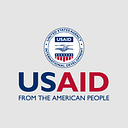In the Fight Against Extortion in Guatemala, This Woman Is the Boss
Prosecuting gang violence, achieving justice and security
Emma Flores, 38, is known as the “Boss of Extortion.” She’s been fighting for victims of extortion in Guatemala since 2005, helping to deliver 150-year sentences to predatory gang members, despite threats to her life.
Emma’s passion for justice dates back to her childhood, she said, when she would conduct mock hearings and pretend to be a lawyer.
She has since overcome innumerable challenges in her quest to fight extortion — including being a woman and earning the trust of the police. “In the field, and on the street, it’s a man’s world,” she said.
She is now the head of the USAID-supported Extortion Unit at the Public Ministry in downtown Guatemala City, and one of 130 prosecutors in Guatemala.
“I love my job,” Emma said. “I like listening to victims and, after a job is done, showing them that the people that were harming them have been arrested and that they no longer have to pay an extortion fee — this is the satisfaction that doesn’t have a price.”
A Regional Phenomenon
An estimated 54,000 gang members operate in the Northern Triangle countries — Guatemala, El Salvador and Honduras — and are responsible for brutal acts of violence, chronic abuse of women, forced displacement of children and families, and murder rates unmatched in the world. The insecurity they cause drives people from their homelands to the United States in search of safety and opportunity. The gangs formed following the civil wars in El Salvador and Guatemala that ended in 1992 and 1996, and grew with mass deportations of Los Angeles gang members from the United States.
Yet it is extortion that fuels many gangs’ survival and causes the most widespread public anxiety. The gangs indiscriminately plague local residents, businesses, urban and rural transportation companies, and bus drivers, demanding high initial protection fees followed by monthly payments. The gangs deliver the threat by phone, then instruct victims to send money to a bank account in the name of their wife, mother or girlfriend, rather than their own.
Emma says many youth join gangs because they are looking for a sense of identity, purpose and status — which often do not exist in their communities or families. However, as recruits rise in rank, they start to lose their sense of humanity and become increasingly cruel.
Curbing the Trend and Finding Justice
Still, there are signs of hope in Guatemala.
In 2015, USAID helped Guatemala’s Office of the Attorney General establish the Specialized Prosecutors Office Against Extortion Crimes. The effort included developing a new case management system hand-in-hand with prosecutors, providing equipment and on-the-job training, and strengthening investigative procedures and interagency coordination.
An estimated 54,000 gang members operate in Guatemala, El Salvador and Honduras.
Prosecutors like Emma can now link homicide cases to extortion, ensuring there is enough evidence to take before a judge and win. And based on improvement in investigations and the dismantling of many gang structures, there has been a dramatic decline in murder rates, from 46 murders per 100,000 inhabitants in 2009 — the most violent year in recent history — to a current rate of 27 per 100,000.
The unit is working on both individual and group extortion cases. In one case, three independent taxi drivers were told that until the extortionists were paid, they would start killing the drivers’ children, their families, and then the drivers themselves. For almost two years they lived in constant fear.
“When the phone would ring, we would shake,” they said.
During that time, the drivers worked four days a week for their livelihood, and then two days to make their monthly extortion payments. All the while, however, they were also developing their case with Emma and her fellow prosecutors. This often included a prosecutor photographing the cash transfers, frequently in commercial centers. Thanks to the operation — which included wiretapping calls to intercept gang coordination and planning of murders — the drivers are no longer under threat.
“When the phone would ring, we would shake.”
In its efforts to strengthen the investigation and prosecution of crime in Guatemala, USAID also supports the National Institute of Forensic Science, an independent institution founded in 2007. Through the institute, scientific evidence — such as voice and physical chemical analysis, genetic testing, and toxicology — is evaluated and presented at trial to support prosecutors’ allegations. Such evidence has been connected to cases 99 percent of the time, especially in instances of mass rape.
This forensics evidence has also reduced reliance on witness testimony, which often puts individuals in danger — and even at risk of being murdered.
Each year, the institute receives 168,000 requests for evidence analysis from the Public Ministry, extortion prosecutors, and judges. With video conferencing, the institute provides expertise in the courtroom from their main office in Guatemala City and 13 regional offices throughout the country — including mobile units on crime scenes.
Jorge Cabrera recently completed a five-year term as director of the institute. When he was 9, during the civil war, his older brother, a law student, was murdered because of his association with an anti-government student organization. Jorge was inspired to study medicine and become the country’s highest level pathologist.
“My goal has always been to solve cases for others in honor of my brother, whose murder still hasn’t been investigated,” he said.
By partnering with local leaders like Emma and Jorge to improve the prosecution and adjudication of crime, USAID continues to support the efforts of government and civil society to achieve security and justice for the citizens of Guatemala.
About the Author
Jessica Benton Cooney is the Communications Specialist for USAID’s Center of Excellence on Democracy, Human Rights, and Governance.

